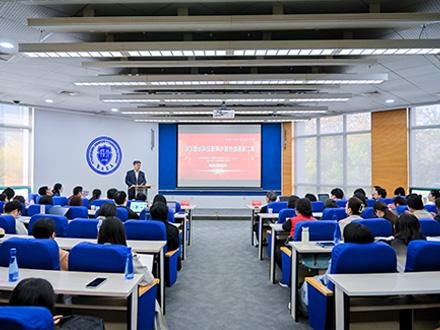The Second Forum on AI & Communication and Cyberspace Governance Was Held
2024-10-27
On October 27th, the Second Forum on AI & Communication and Cyberspace Governance was successfully held at the Weijin Road Campus of Tianjin University. This forum was hosted by the International Cyberspace Governance Research Base of Tianjin University and the School of New Media and Communication of Tianjin University. Over 100 participants, including Han Qinghua, Deputy Secretary of the Party Committee of Tianjin University; Zhang Hongzhong, Dean of the School of Journalism and Communication of Beijing Normal University and Director of the Research Center for New Media Communication of Beijing Normal University; Zhou Baohua, Deputy Secretary of the Party Committee and Vice President of the School of Journalism of Fudan University; Dai Lina, Head of the Research Base for International Cyberspace Governance of Shanghai Academy of Social Sciences and Deputy Director of the Journalism Research Institute of Shanghai Academy of Social Sciences; Dong Zhenhua, researcher, technical expert, and project manager of Huawei Noah’s Ark Lab; Wang Zan, Secretary of the Party Committee of the School of New Media and Communication of Tianjin University, as well as professionals from the industry and teachers and students from domestic universities, attended the forum. The forum was presided over by Li Jinfu, Deputy Secretary of the Party Committee of the School of New Media and Communication of Tianjin University.

Han Qinghua pointed out that in the face of a new round of intelligent technological revolution and the profound changes it has brought to global media forms and communication patterns, how to enhance China’s cyberspace governance capacity has become one of the major issues. The holding of the Forum on AI & Communication and Cyberspace Governance is a powerful response to this major issue. He hoped that experts and scholars attending the forum would conduct in-depth exchanges and discussions during the forum, promote the construction of China’s independent knowledge system in journalism and communication studies, and contribute to the construction disciplinary, academic, and discourse system of philosophy and social sciences with Chinese characteristics.

The forum not only provided a high-quality academic exchange platform for experts, scholars, and young students, but also injected new vitality into research of AI & communication and cyberspace governance, demonstrating Tianjin University’s active efforts in promoting cyberspace governance and global media communication research. In the future, the School of New Media and Communication of Tianjin University will continue to work together with all parties to jointly explore new paths for AI & communication and cyberspace governance, contributing to the construction of China’s independent knowledge system in journalism and communication studies, the promotion of a community with a shared future in cyberspace, and the construction of a more effective global media communication system.


